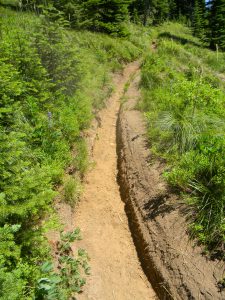
The use of off-road vehicles (ORV) on federal public lands has rapidly increased over the past fifty years. ORV’s are permitted, under certain circumstances, by all four federal land management agencies: National Park Service, Bureau of Land Management, US Forest Service and the US Fish & Wildlife Service.
Four-wheelers, motorcycles and snowmobiles are allowed on the Clearwater and Nez Perce National Forests. A Forest Travel Plan guides decisions for where and when ORV’s are allowed on the National Forests (unfortunately, mountain bikes are only occasionally addressed in Forest Plans, despite the fact they cause impacts). FOC brought a lawsuit against the Forest Service in 2013, challenging the Clearwater Travel Plan. A federal judge ruled that, indeed, the travel plan did not adequately protect important elk habitat, nor did it minimize impacts from ORV’s. Learn more here. A record of decision was just issued for the Nez Perce National Forest Travel Plan. We are currently analyzing the decision. FOC is also tracking the Travel Plan for the St. Joe National Forest.
President Richard Nixon and President Jimmy Carter recognized the potential threats of off-road vehicles on public lands over thirty years ago. Each issued executive orders during their presidency, charging agencies like the Forest Service, with the responsibility of ensuring that any designated trail(s) for motorized use cannot have adverse effects on the landscape and/or conflict with current uses. To this day, these executive orders guide federal agencies with direction on how to regulate off-road vehicles on federal public lands.
Impacts from off-road vehicle use on public lands can be harmful. They can compact soils, trample native vegetation, spread exotic weeds, increase erosion and run-off, degrade fish and wildlife habitat, effect recovery of threatened and endangered species, increase noise and sound pollution and harm cultural resources. Off-road vehicles can also create illegal “trails” and further impact areas that were never designated for ORV use in the first place. Until recently, agencies permitted ORV cross-country travel!
Agencies currently lack the funding and the staff to monitor trails open and/or closed to four-wheelers, motorcycles and snowmobiles. Many times enforcement does not take place where violations have occurred. To the Forest Service’s credit, they do respond to citizen complaints about potential violations, including those filed by FOC. Our membership and staff have reported illegal ORV trespassing in both the Gospel-Hump Wilderness and Selway-Bitterroot Wilderness.
Lastly, the use of off-road vehicles in important undeveloped roadless areas on federal public lands, including the Clearwater and Nez Perce National Forest, potentially hinders the ability to designate these irreplaceable areas as Wilderness. Places like Meadow Creek Roadless Area, Weitas Creek Roadless Area, Fish & Hungery Roadless Area are threatened with ORV abuse. Our public lands, particularly roadless areas, should not be motorized amusement parks!
Other News
♦ Judge declares Clearwater National Forest Travel Plan illegal – March 2015.
♦ Thrillcraft – The Environmental Consequences of Motorized Recreation is an excellent source to learn more.
Return to main Other Issues page.